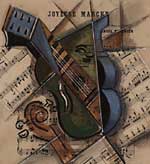Writings on the psychology of music composers and their works is an outgrowth of an avocation of singing and an interest in collective consciousness as ciphered by creative artists such as composers.

- Music and the Psychology of Pacifism: Benjamin Britten's Requiem explores the individuation of composer Benjamin Britten and his collective interpretation to post war Europe and the United States through an analysis of his War Requiem.
- Verdi's Midlife Requiem. The events in Verdi's personal life that led to the creation of his Requiem Mass and its sumptuous form are complex but worth the telling.
- The Coming-of-Age of a New Hero. If Bach's B minor Mass was the summary work of the renowned old master, Handel's Dixit Dominus is all about the coming-of-age of a new hero.
- Mozart and Haydn: Two Lives of Musical Genius. Genius is fragile: Mozart could have succumbed psychically to his father’s intrusive authority and to the musical world’s ambitions for him; Haydn could have accepted the role of a court musician mired in the ceremonial demands of Viennese society. Fortunately for the world, these two geniuses’ commitment to making great music enabled them to insist on the artistic independence that allowed them to create their unique legacies.
- The Search for Carl Orff. Despite abundant privilege, talent, and resources, Orff still had to find his own voice as a creative artist. This was not an easy task in the midst of the tumultuous musical transition from the overripe German Romanticism to the newer, more abstract “absolute” music championed by Schoenberg and Stravinsky.
- Felix Mendelssohn: A Nearly Perfect Life. Two special factors might have supported and influenced Mendelssohn’s remarkable gifts: his Jewish identity and his relationship with his older sister Fanny Hensel.
- Maurice Duruflé: A Man Out of Step with His Times. Eschewing change, he was a conservative in a radical world ... Within the very tight personal and musical orbit in which he worked, Duruflé was a phenomenon.
- Bach and Mozart: The Epitomes of Their Eras. Great composers, no matter their individual brilliance, reflect their particular worlds; they are shaped and controlled by contemporary forces in addition to their genetic endowment.
- Father & Son: The Two Bachs. During their lifetimes, though, the son was judged the more important musician, and he blazed his own creative path as composer, innovator, and musical scholar.
- Johannes Brahms: The Musical Resolution of a Conflicted Personality. Brahms can be said to have truly given his life to his art. Through his genius, his utter devotion to his work, and much personal sacrifice, he turned his own suffering and psychological trauma into a sublime if agonizing world for himself and a thrilling experience for his audiences. We can only be grateful.
- Ralph Vaughan Williams: A Very Small Silver Spoon. An aging Ralph Vaughan Williams said that he was born with "a very small silver spoon in my mouth." He was reflecting on his privileged social standing (in a nation fixated on class differences) and on his own self-doubts, sometimes echoed by contemporary music critics, about his musical talents.

